Is the EU Ready to Implement Its EUDR Requirements?
Addressing key concerns from producing countries is vital in ensuring a fair and just implementation of the EUDR.
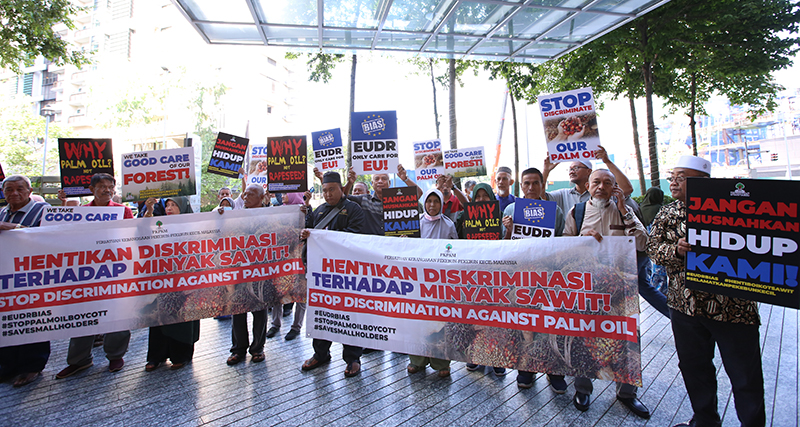
The European Union Deforestation Legislation (EUDR), which came into force on 29 June 2023, remains contentious, particularly amongst developing countries including Malaysia. The legislation requires seven commodities and their derivatives - cattle, cocoa, coffee, oil palm, rubber, soya, and wood entering the EU market to be deforestation-free, produced by adhering to the relevant legislations of the country of production, and covered by a due diligence statement. Malaysia exports 4 out of the 7 commodities into the EU: palm oil, rubber, timber, and cocoa. Key concerns on the regulation include the cost implication from geolocation and traceability requirements, financial and technical limitations of smallholders, supply chain complexities, and the Country Benchmarking System.
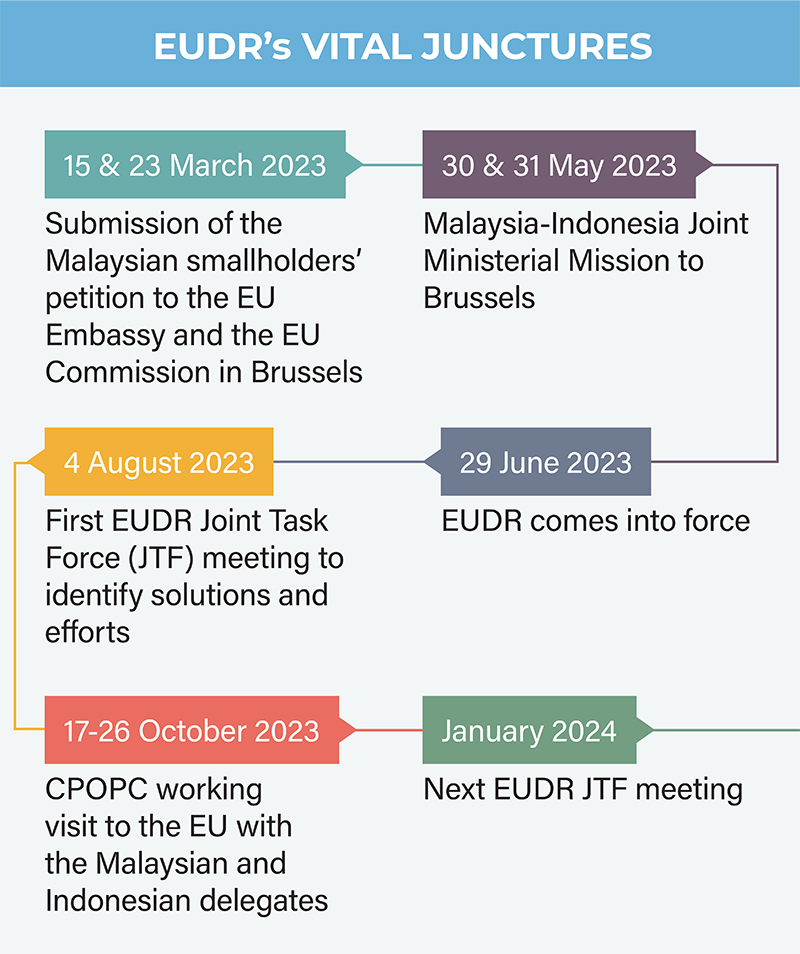
The Malaysian Government and palm oil sector of Malaysia have been in persistent communication with the EU to voice the country's concerns. This is to ensure that the industry, particularly smallholders will not be excluded from the EU market; to enable the recognition of the Malaysian Sustainable Palm Oil (MSPO) certification scheme and to ensure that Malaysia is designated as a low-risk country under the Country Benchmarking System. This includes the submission of the Malaysian smallholders’ petition to the EU Embassy and the EU Commission in Brussels on 15 and 23 March, respectively, several stakeholder dialogues with key EU policymakers, and the Malaysia-Indonesia Joint Ministerial Mission to Brussels at the end of May 2023 to convey our concerns and objections on EUDR, as well as to reiterate the significant roles of palm oil in socio-economic development, especially for our smallholders in rural communities.
One of the positive outcomes of this Joint Mission is the formation of the EUDR Ad-Hoc Joint Task Force (JTF), which will be a consultative platform for the EU to support EUDR coordination. Furthermore, the Task Force also has the objective of assisting both Malaysia and Indonesia to address issues and concerns pertaining to the implementation of the EUDR and to identify practical solutions and approaches relevant to the implementation of the EUDR.
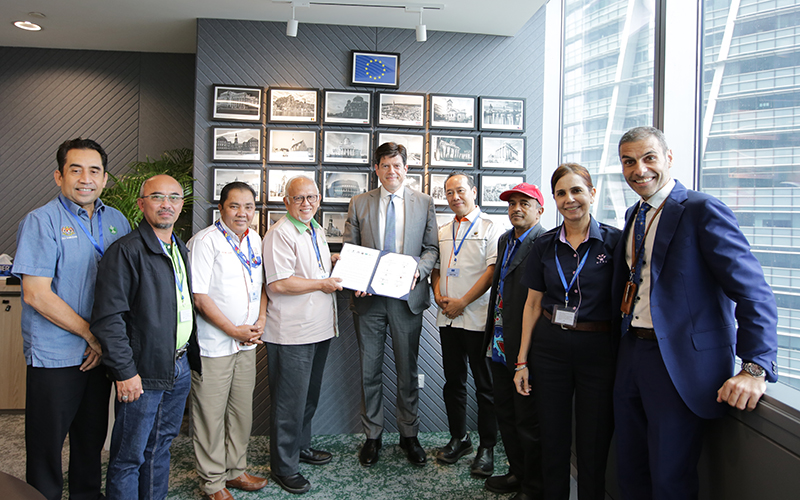
.jpeg)
Members of the Malaysian smallholder delegation handing the petition that highlights concerns surrounding the impact of EUDR on the Malaysian oil palm smallholders to the EU Embassy, Kuala Lumpur and subsequently the EU Commission in Brussels.
As part of its efforts to identify feasible and practical solutions in meeting the EUDR, the 1st Joint Task Force meeting on 4 August 2023 has identified a number of areas for collaboration, which include promoting the inclusivity of smallholders in the supply chain, conducting gap analyses on national certification schemes, and identifying feasible solutions for traceability efforts. However, as there has been very little development from the EU since then, there is an urgent need to evaluate the current progress and readiness of the European Commission, its member states, and its industry members in the implementation of EUDR, as this information would be essential to Malaysia and Indonesia’s preparations in the next EUDR JTF meeting in January 2024.
With this in mind, the Council of Palm Oil Producing Countries (CPOPC) organised a working visit to the EU from 17 to 26 October 2023, comprising the Malaysian and Indonesian delegates.
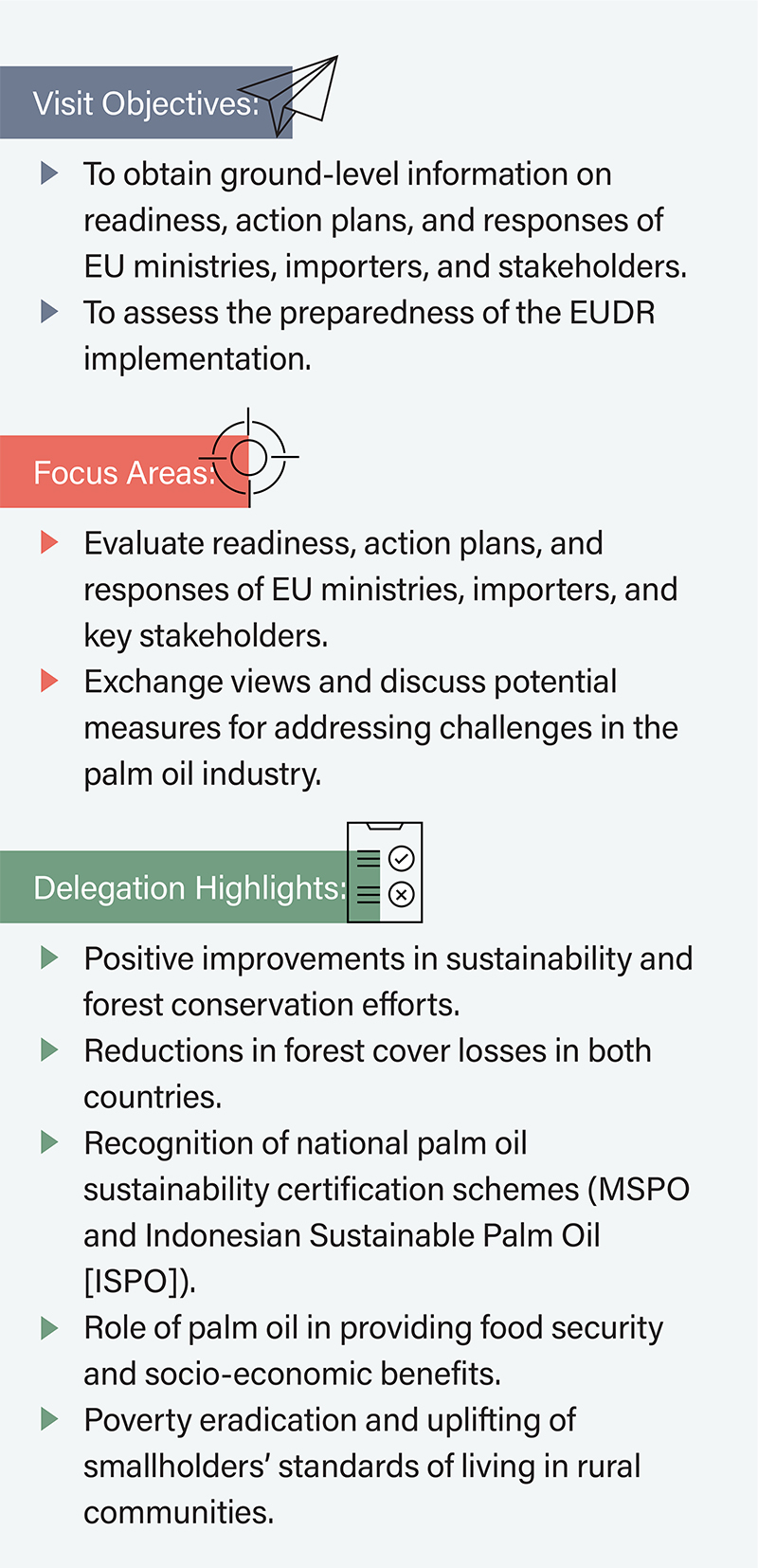
Towards the end of the working visit, it was observed that the EU member states and industry members were waiting for more information on the implementation and enforcement of the EUDR.
The lack of clarity is a major concern, as for the industry members, this would result in supply chain bottlenecks for EUDR-compliant commodities like palm oil by January 2025 onwards once EUDR is enforced.
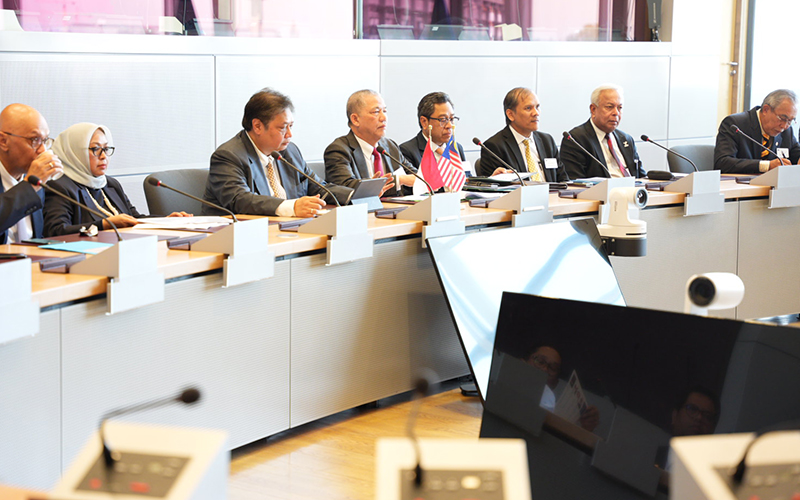
Deputy Prime Minister and the Minister of Plantation and Commodities of Malaysia, YAB Dato’ Sri Haji Fadillah bin Yusof, and H.E. Airlangga Hartarto, Coordinating Minister for Economic Affairs of the Republic of Indonesia raised Malaysia’s and Indonesia's concerns on the EUDR implementation to the EU delegation.
Another potential concern is the lack of harmonisation and standardisation amongst the member states, competent authorities, and ports during the implementation and enforcement of the EUDR requirements, as this could give rise to different interpretations being applied in other member states.
In order to address these concerns, the EU needs to intensify its efforts to share the mechanisms and details of the implementation and enforcement of EUDR with its member states and producing countries. This would ease the concerns of the businesses and the producing countries, and enable better preparations for the requirements.
Malaysia will also continue to engage and foster potential partnerships with the EU, its Member States, and businesses to facilitate the recognition of the MSPO certification scheme, the acceptance of sustainable Malaysian palm oil in the EU market, and the inclusion of its smallholders in meeting the EUDR requirements.



.jpeg)

